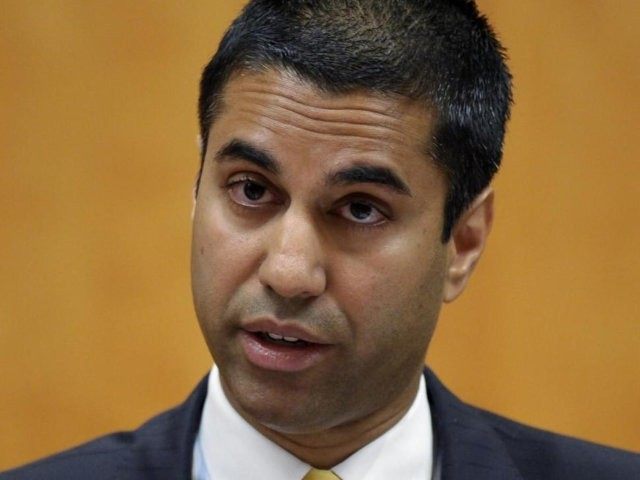Federal Communications Commission (FCC) Chairman Ajit Pai announced in a statement on Thursday that he will move forward with a rulemaking that would clarify Section 230 of the Communications Decency Act.
Pai announced his decision to move forward with a rulemaking to reform Section 230 as Twitter and Facebook censored a New York Post article saying that, contrary to Biden’s claims, Biden allegedly met with an executive at Burisma when he was vice president. Hunter Biden, Joe Biden’s son, reportedly arranged the meeting while he was working as a lobbyist for the company.
The social media giants’ censorship engendered swift controversy, leading Sens. Josh Hawley (R-MO) and Ted Cruz (R-TX), two members of the Senate Judiciary Committee, to subpoena Twitter CEO Jack Dorsey over his decision to censor the Post‘s story.
Pai noted in his statement that all public officials across the spectrum have expressed concerns about big tech’s legal immunity in Section 230. He explained:
Members of all three branches of the federal government have expressed serious concerns about the prevailing interpretation of the immunity set forth in Section 230 of the Communications Act. There is bipartisan support in Congress to reform the law. The U.S. Department of Commerce has petitioned the Commission to ‘clarify ambiguities in section 230.’ And earlier this week, U.S. Supreme Court Justice Clarence Thomas pointed out that courts have relied upon ‘policy and purpose arguments to grant sweeping protections to Internet platforms’ that appear to go far beyond the actual text of the provision.
Pai then revealed that the FCC’s general counsel said the agency has the legal authority to interpret Section 230; therefore, the FCC chairman declared that he will move forward with a rule to clarify the Section 230. He said:
As elected officials consider whether to change the law, the question remains: What does Section 230 currently mean? Many advance an overly broad interpretation that in some cases shields social media companies from consumer protection laws in a way that has no basis in the text of Section 230. The Commission’s General Counsel has informed me that the FCC has the legal authority to interpret Section 230. Consistent with this advice, I intend to move forward with a rulemaking to clarify its meaning.
Pai has long criticized censorship, often noting during the fight to repeal the Obama-era net neutrality regulations that social media companies censor much more than Internet Service Providers (ISPs) such as Verizon or Comcast.
In September 2018, Pai questioned whether edge providers such as Facebook or Google need to abide by “transparency” standards regarding their content moderation practices.
Pai’s decision to move forward with a rulemaking to clarify Section 230 follows as the Trump administration, through the Department of Commerce, filed a petition to the FCC, asking the agency to propose regulations that would clarify provisions within Section 230.
To pass such a rulemaking through the FCC, the agency would likely need three Republican votes. FCC Commissioner Brendan Carr has been vocally supportive of efforts to reform Section 230.
As the Trump administration has pulled the nomination of FCC Commissioner Michael O’Reilly, Sen. Roger Wicker (R-MS), the chairman of the Senate Commerce Committee, has reportedly not moved forward with Nathan Simington’s nomination for the soon-to-be-vacant spot at the FCC. Simington would play a crucial role in passing a rulemaking to clarify Section 230 at the FCC if he were confirmed.
Pai charged that, although social media companies have a right to free expression, they do not have an immunity denied to other media outlets.
“Throughout my tenure at the Federal Communications Commission, I have favored regulatory parity, transparency, and free expression. Social media companies have a First Amendment right to free speech,” Pai said. “But they do not have a First Amendment right to a special immunity denied to other media outlets, such as newspapers and broadcasters.”
Sean Moran is a congressional reporter for Breitbart News. Follow him on Twitter @SeanMoran3.

COMMENTS
Please let us know if you're having issues with commenting.